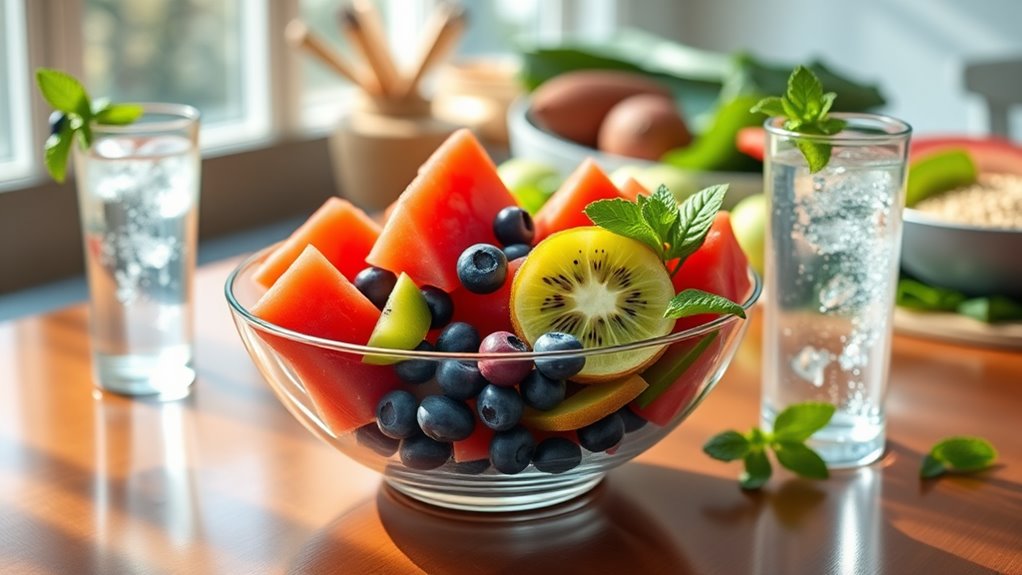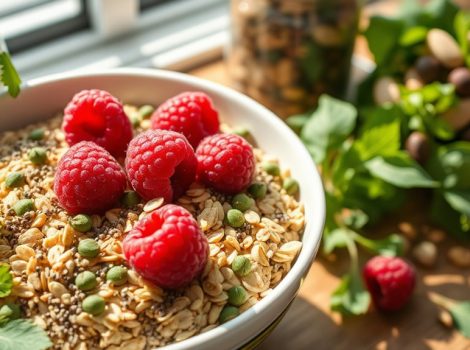How I Improved My Digestion in Just 3 Days
If you’ve been feeling bloated or sluggish, it might be time to reassess your digestion. In just three days, you can make small yet impactful changes that lead to noticeable improvements. By focusing on your diet, hydration, and even stress levels, you can transform how your body functions. Curious about the specific steps you can take to achieve these results? Let’s explore the strategies that made a real difference.
Recognizing the Signs of Poor Digestion
When you pay attention to your body, you might notice some common signs that indicate poor digestion. Experiencing bloating, gas, or irregular bowel movements can point to digestive distress.
You may also feel fatigue, irritability, or even skin issues, all linked to a sluggish gut. If you find yourself reaching for antacids frequently, that’s another red flag.
These symptoms are your body’s way of asking for a natural gut reset. It’s essential to listen and recognize these signs early. Ignoring them could lead to more serious health issues down the line.
Dietary Changes That Made a Difference
When it comes to improving your digestion, small dietary changes can have a significant impact.
By increasing your fiber intake, boosting hydration, and timing your meals more effectively, you can support your digestive health. Incorporating a natural reset drink with ingredients like ginger and lemon can further enhance your gut health and alleviate common digestive issues.
Let’s explore how these adjustments can make a real difference in how you feel.
Increased Fiber Intake
One of the simplest and most effective changes you can make to boost your digestion is increasing your fiber intake.
Adding more fiber to your meals helps keep things moving through your digestive tract, reducing bloating and promoting regularity. Focus on whole grains, fruits, vegetables, and legumes. For example, swap white bread for whole-grain bread or add a side of steamed broccoli to your dinner.
Aim for a gradual increase, as a sudden jump can cause discomfort. Remember to mix different types of fiber—soluble fiber, like oats and beans, can help slow digestion, while insoluble fiber, found in nuts and whole grains, adds bulk.
Hydration Boost
Staying properly hydrated plays a crucial role in maintaining your digestive health.
When you up your water intake, you’re not just refreshing yourself; you’re kicking your digestion into gear!
Here’s how hydration can transform your gut:
- Reduces bloating – Say goodbye to that uncomfortable belly feeling!
- Improves nutrient absorption – You’ll get more from your meals.
- Enhances bowel regularity – No more constipation struggles.
- Boosts energy levels – Stay energized and ready for your day!
Replace sugary drinks with water, aim for at least eight glasses a day, and consider herbal teas as flavorful alternatives.
You’ll be amazed at how a hydration boost can strengthen your digestive system in just a few days!
Balanced Meal Timing
Balancing your meal timing can significantly enhance digestion, especially when you find a routine that works for you.
Start by establishing regular meal intervals—aim for three main meals and one or two healthy snacks throughout the day. Eating at consistent times helps your body recognize when to digest, reducing that sluggish feeling later.
It’s also crucial to listen to your hunger cues; don’t wait until you’re starving, as this can lead to overeating.
Experiment with the timing of your meals; some people thrive on an earlier dinner, while others prefer a light snack in the evening.
Remember, the goal is to nourish your body without overloading it.
The Importance of Hydration
Staying hydrated is crucial for your digestive health, as water plays a key role in breaking down food and absorbing nutrients. It’s important to know how much water you should be drinking each day to keep everything running smoothly. Plus, recognizing the signs of dehydration can help you make adjustments before it affects your digestion. Additionally, incorporating herbal teas can provide a soothing effect and further support your digestive system.
Water’s Role in Digestion
Although you might overlook it, water plays a crucial role in digestion, aiding every step of the process. Staying hydrated not only helps break down food but also ensures nutrients are absorbed efficiently.
Here are four reasons why water is essential for your digestive health:
-
Softens food: Water helps turn food into a mushy consistency, making it easier to swallow.
-
Prevents constipation: Adequate hydration keeps things moving smoothly through your intestines.
-
Aids enzyme function: Water activates digestive enzymes, facilitating the breakdown of nutrients.
-
Flushes out toxins: Staying hydrated helps your body eliminate waste, reducing bloating and discomfort.
Optimal Intake Guidelines
Understanding how water aids digestion highlights just how important it is to stay adequately hydrated throughout the day. Drinking enough water helps break down food, absorb nutrients, and flush out toxins. Here are some optimal intake guidelines to consider:
| Time of Day | Recommended Intake | Tips |
|---|---|---|
| Morning | 1-2 glasses | Start your day refreshed! |
| Before Meals | 1 glass | Helps digestion and fullness. |
| During Meals | Small sips | Avoid overhydration at meals. |
| Evening | 1 glass | Wind down with hydration. |
Aim for about 8-10 cups daily, adjusting as needed based on activity level and climate. This simple practice strengthens your digestive health, making you feel better overall.
Signs of Dehydration
Dehydration can sneak up on you, often manifesting through subtle signs that are easy to overlook.
Being aware of these signs is crucial for keeping your body functioning at its best. Here are four signs you shouldn’t ignore:
-
Thirst – Feeling thirsty is your body’s first warning sign that you need more water.
-
Dry Mouth – A parched mouth can indicate that your hydration levels are low.
-
Fatigue – If you’re feeling unusually tired, dehydration might be the cause.
-
Dark Urine – If your urine is darker than usual, it’s a clear sign that you need to hydrate.
Recognizing these symptoms early can help prevent more severe health issues and improve your digestion significantly.
Stay hydrated!
Incorporating Probiotics and Prebiotics
Incorporating probiotics and prebiotics into your diet can significantly enhance your digestive health. Probiotics are beneficial bacteria found in foods like yogurt, kefir, and sauerkraut. They help balance your gut flora, reducing bloating and improving nutrient absorption.
Start by adding a serving of yogurt to your breakfast or snacking on fermented foods throughout the day.
Prebiotics, on the other hand, are fibrous foods that feed these good bacteria. Include bananas, onions, garlic, and whole grains in your meals to support your gut.
A simple way to combine both is a smoothie with yogurt and a banana, ensuring you get a healthy dose of both probiotics and prebiotics. This balanced approach can lead to noticeably better digestion in just a few days. Additionally, starting your day with warm lemon water can help in naturally resetting your gut to enhance overall digestive function.
Lifestyle Adjustments for Better Gut Health
While you mightn’t realize it, small changes in your daily routine can profoundly impact your gut health.
Making some lifestyle adjustments may help you feel better and support your digestive system. Here’s what you can do:
-
Stay Hydrated: Drink plenty of water throughout the day to aid digestion and nutrient absorption.
-
Move More: Incorporate regular physical activity, like walking or yoga, to improve gut motility.
-
Prioritize Sleep: Aim for 7-9 hours of quality sleep each night; it’s essential for restoring gut health.
-
Manage Stress: Practice mindfulness or relaxation techniques to lower stress levels, which can negatively affect digestion.
Additionally, a comprehensive guide indicates that herbal remedies can further support your digestive balance.
Implementing these adjustments can lead to a happier, healthier gut in just a few days.
Give them a try!
Maintaining Long-Term Digestive Wellness
Maintaining long-term digestive wellness is essential for overall health, and it’s easier than you might think. Start by incorporating a variety of fiber-rich foods like fruits, vegetables, and whole grains into your diet. These not only aid digestion but also nourish your gut bacteria.
Stay hydrated, as water is crucial for digestion and helps maintain regular bowel movements. Regular exercise plays a vital role too; even a daily walk can stimulate your digestive system.
Don’t forget to manage stress, as it can wreak havoc on your gut. Mindful eating—chewing slowly and savoring your food—can also promote better digestion. Additionally, consider using natural remedies such as herbal teas or supplements to further support your digestive health.




